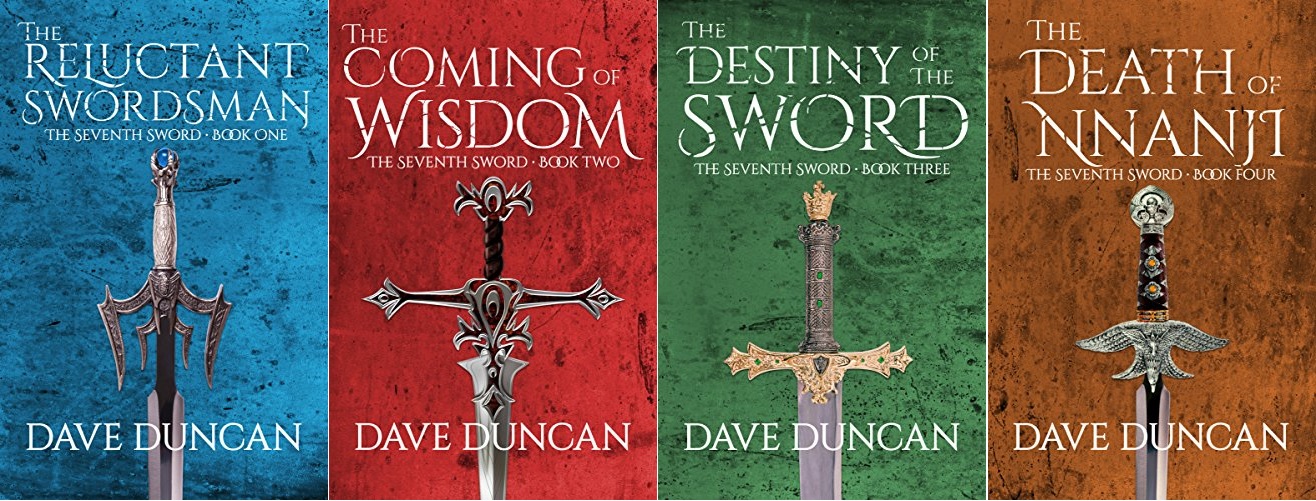Dave Duncan – The Seventh Sword

Ah the Eighties, what a decade. There’s no ironic nostalgia here, I was lucky to be born in 1978 and spent my childhood blissfully enjoying the wealth of cultural phenomena, actual queues at the cinema for great films (Star Wars, E.T. Ghostbusters, The Goonies, Back to the Future, Labyrinth, Big), a top 40 which wasn’t 50% Ed Sheeran (Wham, Duran Duran, A-Ha, Whitesnake), Arcade games in which you were lucky to survive for more than 5 minutes and had to stand up to play (Pacman, Centipede, Gauntlet), technological wonders (Sony Walkman, Nintendo Gameboy, Commodore Amiga, floppy disks), and the best toy of all time, Big Trak!
The Eighties also saw the emergence of several enduring and influential fantasy authors, Robert Jordan, David Eddings, Raymond E. Feist, Tad Williams, David Gemmell, R.A. Salvatore to name a few. How about Dave Duncan, is that a name you recognise? Perhaps if you hail from North America, but if you live on the other side of the Atlantic, I think it’s more likely that you haven’t. I can’t recall ever seeing any of his books in my friendly local book shop, or even Waterstones (disclaimer – until a few years ago I wasn’t specifically looking for Dave Duncan, so if you work in a book shop and you stock Dave Duncan, my humble apologies). This is a real shame, Mr Duncan may not enjoy the critical or commercial recognition some of the names above do, but the three series I’ve read are fast paced, inventive and strong examples of world building. I’ll look at one below and the other two in a few days time.
The Seventh Sword
Wallie Smith, a chemical engineer from Earth is dying. Elsewhere in the Universe, Shonsu, a barbarian master swordsman, is physically gifted but intellectually lacking for the task at hand, so his Goddess decides to transplant Wallie’s soul into Shonsu’s body. Wallie must quickly come to terms with his own death, the sudden lack of technology, the rigid conventions of his new culture, and the unceasing pressure to defend his status as Master Swordsman. As if that wasn’t enough, he also needs to comply with the Goddess’ wishes and thwart corruption that threatens to undermine the local theocracy, benevolent of course, and bestow a form of tyranny on her worshippers.
The world in which Wallie now lives features a strict hierarchy, in theory the priests of the Goddess are in charge, but their authority is policed by the swordsmen, with various other guilds working below these. Within each guild there are seven levels of attainment, progression through the levels is achieved by mastery of sutras, rote learnt proverbs which must then be exhibited in behaviour. In any particular setting the highest rank individual will be in charge, in the event of multiple individuals at the same level being in place, only one can assume authority and in the case of the swordsmen that authority is derived through individual combat. Shonsu is a level seven swordsman and therefore a potential threat to the authority of the local Reeve, who just happens to be part of the corruption and distinctly unhappy about the presence of another level seven.
The author does an incredible job of creating a believable world and remarkably intricate social structure which, while vastly different to our own, make sense in and of themselves. The main characters are well developed and multi-dimensional. The narrative covers two main arcs, the quest itself and the challenges to Wallie’s morals and sensibilities. My one major qualm lies in the somewhat misogynistic treatment of the female characters, in keeping with the culture of Wallie’s new home they are very much treated as objects of ornamentation or gratification. This does improve markedly as the series expands but can feel very anachronistic to begin with. If you can overlook this aspect, the rest of the series is a very enjoyable, far reaching adventure. I found myself fully engaged with the story and I have yet to read a better example of the fish out of water style of fantasy.